In this blog post I will tell you 27 ways to reduce your plastic waste. By reading this article you’ll learn how plastic pollution affects the earth, how you can start reducing your plastic consumption and how to make lasting lifestyle changes without feeling overwhelmed!
This article contains affiliate links.
Right now we are in a global plastic trash crisis. Way to much plastic is produced, way to little is recycled and scary much is thrown away mindlessly and ending up in landfill, in nature and in the ocean.
If you thought that plastic pollution doesn’t concern you, you are wrong. You are directly affected by the growing pile of plastic waste on this precious planet. Tiny bits of plastics, called micro plastics, are already contaminating the food we eat, the water we drink and the air we breathe.
We also come in contact with toxic chemicals, like BPA and phthalates, that are added to plastic to give it certain qualities. Both the micro plastics and toxins in plastic negatively affect human health and over exposure to them can lead to inflammation, endocrine disruption, cancer and other diseases and health problems.
Besides plastic being a serious threat to human health, it’s also a threat to wildlife, ecosystems, poor communities and the future generations of life on this planet.
Let’s get into how plastic affects the earth and what we personally can do to stop the over consumption of plastic in this world!
How Plastic Affects the Earth
Every year about 10 million tonnes of plastic get dumped in the ocean, which is more than one garbage truck every minute of the day. At this rate, there will be more plastic than fish in the ocean by 2050 which is an unbelievable and depressing fact.
The sea has become a garbage soup. Plastic is floating around and is washed up on the shores, eaten by animals or broken UP into micro plastics. Nature is littered, millions of animals are killed and the health of poor communities is greatly affected by the huge amount of plastic poisoning their living areas. But not only does plastic do harm in the form of waste, it is actually harmful in every stage of its ”life cycle”.
Firstly the extraction of fossil fuels (which plastic is created from) releases toxic substances in the air and water. The production of plastic itself also does the same thing, letting out toxic fumes and substances polluting the environment.
Secondly, plastic products and packaging contain toxic chemicals which can leach out and directly affect our health and cause a wide range of serious health problems, including cancer, depression and infertility.
Thirdly, even plastic waste management like recycling, incineration and pyrolysis (converting back plastic into fuel) is harmful, exposing workers and the environment to toxic substances released in the process.
When the plastic isn’t managed, it litters the planet and is broken up into micro plastics, which right now are everywhere. They are making their way up in the food chain, polluting drinking water and affecting the health of all living beings on the planet.
This is just a brief summarization of some of the harming effects that plastic has on the earth.
How plastics harms life on earth:
- Endangering wild life and killing millions of animals each year.
- Endangering and polluting nature, the ocean and the entire ecosystem.
- Polluting communities around the world, especially the poor ones.
- Polluting the soil and water where we grow our food and get our drinking water from.
- Causing harm and pollution everywhere by never breaking down but breaking up into micro plastics.
- Contaminating the food chain with micro plastics.
- Threatening human health, the health of other species and the health of the planet.
- Harming people who work with the production and waste management of plastics.
- Harming people living near places where plastic is produced or managed.
- Contributing to climate change because of the extraction of non-renewable fossil fuels to produce plastic.
How much plastic is out there?
The plastic industry started in the early 1900’s when the the first synthetic plastic was created. Since the 1950’s, when mass production of plastics really began, 8.3 billion metric tonnes of plastic has been produced. This huge number is from a study done in 2017, so right now the numbers are even higher.
From the 8.3 billion tonnes of plastic that were made, 6.3 billion have become plastic waste. From this only 9 % of the total amount has been recycled and 12% incinerated. That means that 79 % has ended up in landfills, nature and oceans.
Plastic production is also still growing rapidly. In 1950 there was about 2 million tonnes of plastic produced annually. In 2019 it had increased to 368 tonnes annually. Today plastic production is not slowing down and the numbers are still rising rapidly.
Where does it all come from?
50 % of all the plastic produced are single use items. These items are used once and then disposed, only to last in the environment for hundreds of years and being broken up into a million of microscopic pieces polluting the earth.
Most of the plastic are produced for packaging, which is only used once and then thrown away. That is almost 40% of all produced plastics thrown away just after being wrapped around some kind of product, what a waste!
Take a look at the top 10 plastic items found littering the oceans. These are all things one human has personally used, which means that you personally can make a difference by stopping to use these single use plastic items! 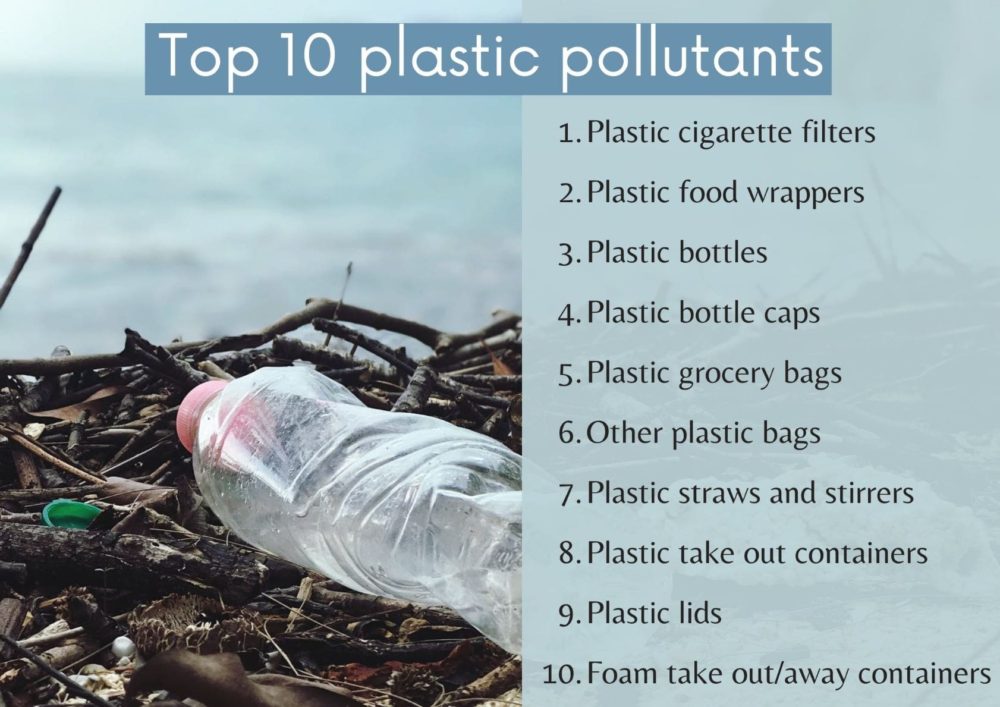
27 Ways to Reduce your Plastic Waste
To stop plastic from destroying the environment, we have to ”turn off the tap”, which is done by addressing the source of how plastics floods into the environment: The production of new plastics. But because we can’t do that directly, we have to think of things we personally can do to help lessen plastic production.
A way of doing that is to stop buying plastics! When the consumer refuses to buy a product made of or wrapped in plastic, we lower the demand for them and force the producers to look for an alternative. Another way is actively requesting a more earth friendly packaging from business owners themselves, and sharing that you will go and shop somewhere else unless they make a change.
✧ Read: The Best Sustainable Swimwear Brands From Europe
Now that we know the seriousness of the plastic trash crisis, I hope you find some motivation in making an effort in reducing your plastic waste! Both for the earth, for your own health and well-being and the lives of future generations.
GROCERY SHOPPING
”You are voting with your dollar”. What you buy shows the supplier that the consumer wants more of it. That is why your choices matter more than you think.
1. Use reusable shopping bags.
Plastic grocery bags are on the top 5 of the items that litter coastlines the most. Instead of buying a plastic bag, get a big reusable cotton bag you can use over and over again! If you happen to forget your reusable bag, choose to buy one made of paper. If you are going to buy fruits and vegetables, you can also use reusable fruit bags.
2. Stop buying snacks packed in plastic.
Stop buying snacks and candy wrapped in plastic to reduce your plastic waste. Choose the snack wrapped in paper instead! Another solution is starting to make your own snacks at home. Homemade snacks are often healthier and contain no additives. This will also results in eating less sugar and unhealthy processed foods, which your body and skin will thank you for!
3. Avoid buying food stored in plastic.
Instead of buying something stored in plastic, look if there is an alternative! Often you can buy the same product but in cardboard or glass. Also choose vegetables and fruits that aren’t packed in anything over the ones packed in plastic.
4. Go bulk shopping.
To avoid all kind of food packaging, look if there is a bulk shop nearby your living area. If there isn’t, buy big packs in your regular supermarket to both save money and packaging material.
5. Go to the farmers market.
A farmers market is a great place to buy organic food like vegetables and fruits that aren’t packed in plastic! Also the products will probably be really fresh and locally produced, which is the best for both your body and the planet.
6. Pre plan meals and make a shopping list.
Make sure you got the ingredients you need for cooking a healthy meal from scratch at home. That way there are less chances that you will grab the easy option wrapped in plastic when you are tired. Also it will save you from multiple trips to the super market because you can get everything for a week in one go!
IN THE HOME
1. Invest in glass food containers and get rid of the plastic ones.
Plastic leaches toxic chemicals when stored for a long period of time, comes in contact with oil or when getting heated up. If you want to check off all of these conditions in one single go you should store leftover food in plastic containers and reheat it in the microwave (yum…). Invest in glass food containers or reuse glass jars from previously bought food, to avoid consuming toxins and micro plastics along with your food.
2. Use beeswax wrap instead of plastic wrap.
Investing in reusable food wrapping like beeswax wraps will reduce your plastic waste in the kitchen! Also your food will not come into contact with plastics which otherwise could leach toxins into the food. Personally I use the beeswax wraps from Abeego and I’m not disappointed!
3. Cook food from scratch.
You can reduce your plastic waste by cooking food from scratch and avoid prepackaged and processed foods. Not only will you be contributing to less plastic waste in the world, but you will also become healthier and really connect with the food you spend time on preparing.
4. DIY cleaning products.
Cleaning products almost always come in plastic bottles, which you throw away once they are empty. In addition cleaning products are loaded with toxic chemicals you come in contact with while cleaning and breathing! For a natural and plastic free option, make your own cleaning products with simple products like water, vinegar, bicarbonate soda, bar soap, lemon and maybe some essential oils. Bonus: Save cupboard space & money.
5. Buy laundry detergent in boxes.
If you don’t want to make your own laundry detergent, but still want to reduce your plastic waste, you can buy laundry detergent in cardboard boxes instead of the plastic containers! Easy swap with no extra requirements from your part.
6. Reuse glass bottles and containers.
There is no need to buy new if you are on a tight budget. The most eco-friendly option is to reuse what you already have! Clean the glass bottles and containers when they are empty and reuse them for you own DIY projects.
7. Buy matches instead of plastic lighters.
Small plastic lighters are often not refillable and end up in landfill (or in the ocean…) because they are not recyclable. To reduce your plastic waste, buy matches instead of disposable lighters! Opting for eco-friendly matches or maybe a (good quality) chargeable lighter will help you reduce your plastic waste.
8. Buy loose tea in paper bags instead of tea in teabags.
Because yes, there could be plastic in your teabags. They used to seal the teabags with a small amount of plastic. Even if the company uses bio-plastic coating made from organic materials instead of petrochemicals, it is still a type of plastic. To be sure you’ll avoid plastic buy loose tea in paper bags instead!
9. Plant your own herb garden.
Fresh herbs almost always come wrapped in plastic. A great hack is to grow your own herbs in a herb garden! You can even do this in an apartment, and put the pots in a windowsill. If you take care of your herbs you always have access to fresh herbs when you’re cooking! Not only will you reduce your plastic waste, but you’ll also save a lot of money.
BEAUTY & BATHROOM
1. Buy beauty products stored in glass.
Many beauty products come stored in plastic tubes. If the products inside the plastic container contain oil, chances are chemicals from the plastic will leach into your luxurious beauty products! Of course we don’t want that on our skin, which absorbs everything into our bodies. To avoid this and reduce your plastic waste, buy beauty products stored in glass containers.
There are many natural beauty products stored in glass containers on So Natural Beauty! (Use code 16761406 when you create an account to receive a 5€ voucher code)
2. Get a safety razor.
Instead of constantly having to buy razors and throwing away the dull ones (they are not recyclable) invest in a good safety razor! It is cheap to buy new blades and the old ones will also be recyclable. You’ll both save money and reduce your plastic waste! Although, be careful with using a safety razor! They are really sharp and it’s easy to cut yourself with them if you are not careful (talking from experience hehe).
3. Ditch the tampons and pads.
There are many options out there for a plastic free period! Menstrual cups, reusable pads and period underwear are things you buy once and can use for years without spending another dollar on your period. I use the Organi Cup and Imse Vimse reusable pads on cramping days.
4. Use bamboo toothbrushes.
Normal plastic toothbrushes aren’t recyclable, and end up incinerated, in landfill or worst case in the ocean. Bamboo toothbrushes are a much more earth friendly option! The handles made of bamboo are compostable and the bristles made from nylon are recyclable. There are however also completely plastic free toothbrushes made from bamboo and boar bristles!
5. Make your own toothpaste.
Say what?! Is that even effective? Yes it is! Instead of the white cream (filled with ingredients with names difficult to pronounce) stored in a plastic tube, you can make a simple paste from all natural ingredients in a glass jar. It is just as effective as conventional toothpaste. In this blog post I tell you exactly how to make an effective natural and plastic free toothpaste
6. Swap soap bottles to soap bars.
Buy soap bars wrapped in paper to avoid the plastic packaging and reduce your plastic waste! If you love liquid soap you can always make your own from soap bars too, by grating it and blending it with water.
7. Switch to shampoo & conditioner bars.
To avoid plastic packaging, buy shampoo & conditioner bars instead of liquid versions. These are also perfect for travelling with only hand luggage, instead of pouring your liquid shampoo & conditioner in 100 ml bottles (which I find really annoying).
8. Boy cot the micro beads.
Micro beads are small plastic beads used in toothpaste and beauty products for exfoliating purposes. But those tiny particles will forever flow in our water systems and are almost impossible to filter out. Do not buy products with micro beads! There are loads of natural exfoliants that can do a better job and not harm the environment in the process.
ON THE GO
1. Get a reusable coffee cup if you often buy coffee on the go.
Because even paper cups are lined with plastic, and a hot beverage in plastic can leach chemicals into your drink! Bring your own reusable coffee cup to avoid the chemicals and reduce your plastic waste.
2. Invest in a reusable water bottle.
It is unnecessary to buy water bottled in plastic when you could just take your own water bottle with you and fill it almost anywhere for free! Plastic bottles and plastic bottle caps are also on top 3 & 4 of the most found plastic pollutants on coastlines. So invest in a reusable water bottle to reduce your plastic waste and save the planet :).
3. ”No straw please”.
When travelling, learn how to say this phrase in the local language! Personally I think straws are kind of overrated, but if you don’t agree there are reusable straws in stainless steel you could carry with you if you really don’t want to miss the straw in your drink!
4. Give up regular chewing gum.
Chewing gum is a huge plastic pollutant and also is harmful to animals. Luckily there is a natural alternative to chewing gum that is plastic free! It is made from natural rubber and is completely biodegradable without the plastic and harmful chemicals.
5. Keep a plastic free kit in your car.
Want take out food? A straw in your drink? Eat on the way? Then it is perfect to keep a plastic free kit in your car. Store reusable straws, cutlery, napkins, glass containers or a mason jar in a reusable bag for when you are feeling spontaneous but still want to avoid the plastics!
Tips for Making Lasting Changes & not get Overwhelmed!
So that are 27 ways to reduce your plastic waste! Many of the ways consist of switching to a reusable option, finding plastic free alternatives for products you love and making DIY products for things that you can’t buy without plastic.
Going plastic free will simplify your life and really make you reconsider whether you really need a product or not (often we have been socially conditioned to think we need certain products).
If you want to implement all these tips at once, it’s going to be a tough journey! The much easier option is to slowly make changes that stay for a lifetime. By focusing on one thing at the time and allow yourself to take time to search for a suitable alternative, you will make it an interesting shift instead of a stressful one.
- Focus on one thing at the time.
- Find out where your plastic consumption is the biggest and start to look for alternatives there.
- Instead of focusing on the lack and on what you can’t buy anymore, see it as improving the quality of your life with less.
- Enjoy the process and the lessons you learn along the way.
- Remember the why behind your plastic free lifestyle.
Creating a natural and earth friendly lifestyle is a journey. We don’t have to do it all at at once! Just take your time, allow yourself to make mistakes and do your best.
It is not about being perfect. All the small changes help and inspire others to do the same.
/By Bo Smit
Sources:
- Toxic Effects of Di-2-ethylhexyl Phthalate
- Potent Impact of Plastic Nanomaterials and Micromaterials on the Food Chain and Human Health
- Plastic facts. Plasticocean.org
- The hidden costs of a plastic planet (2017). Center for International Environmental Law
- Plastic Waste worldwide Statistics & Facts
- Planet or plastic? National Geographic.
- Fast facts about plastic. National Geographic.
- Kate Nelson (2020). I Quit Plastics and you can too.
- Plastic pollution. National Geographic
Related Posts
SUBSCRIBE TO EARTHY VIBES
Then you’ll like Earthy Vibes newsletters!
Read our Privacy Policy.

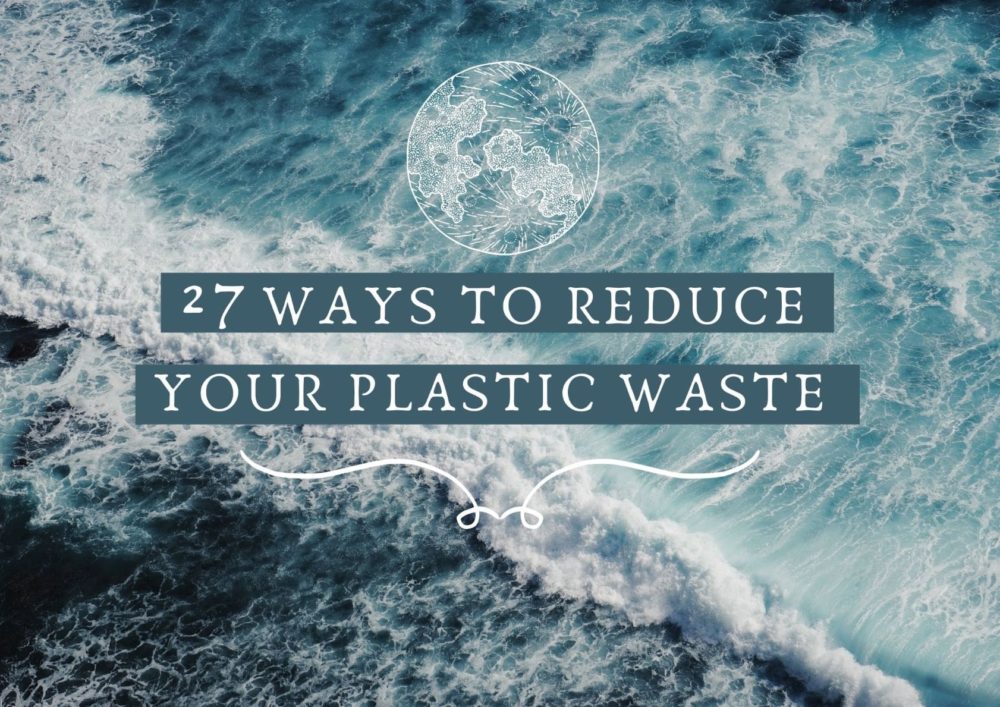
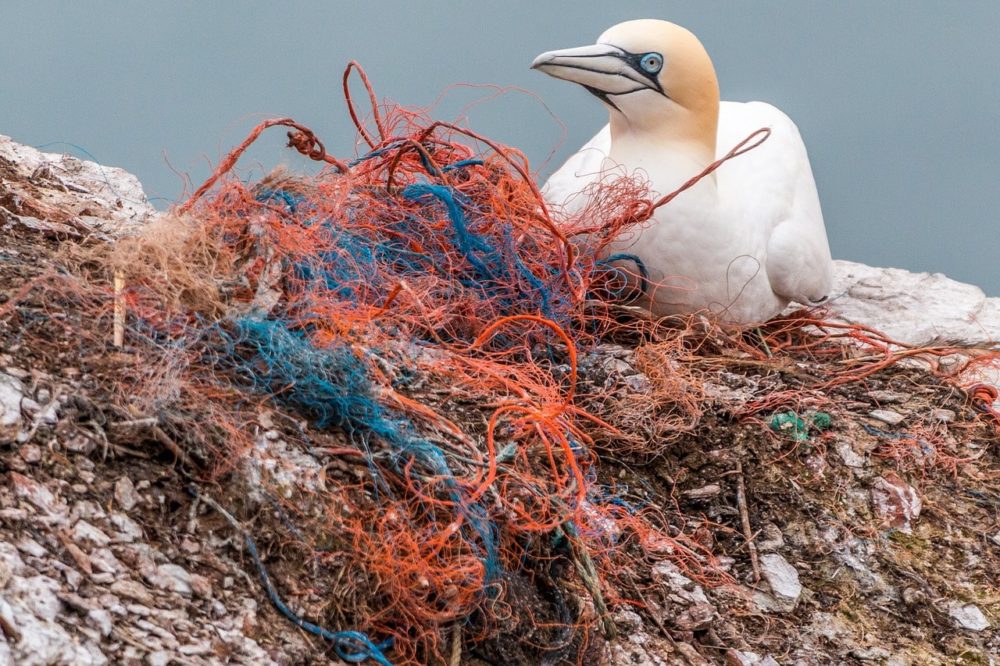
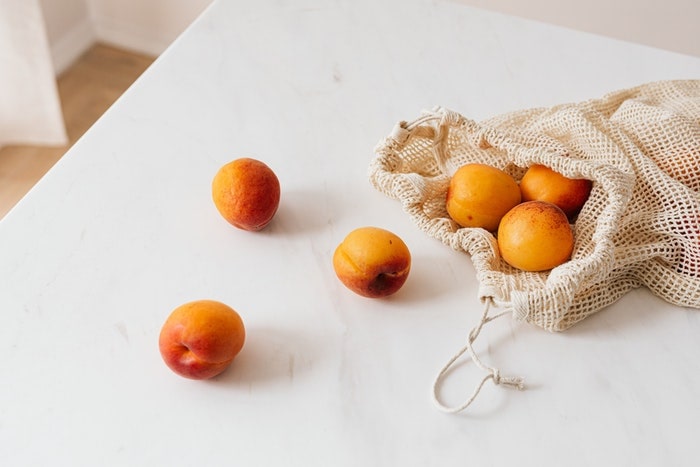
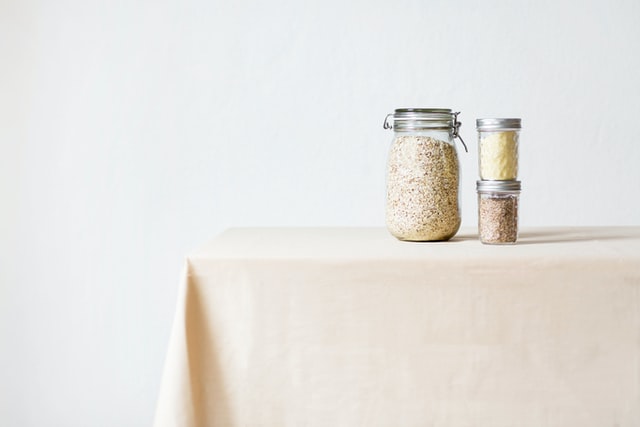
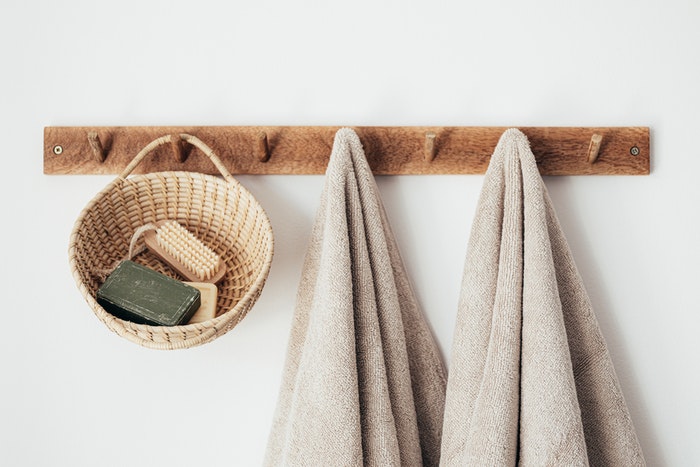
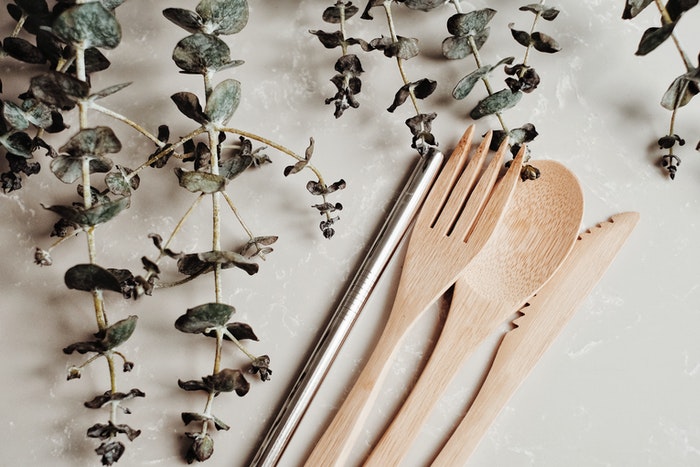

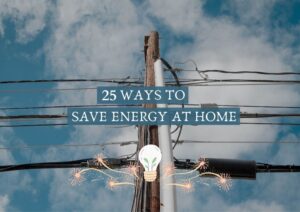

Hail 27! 🙏